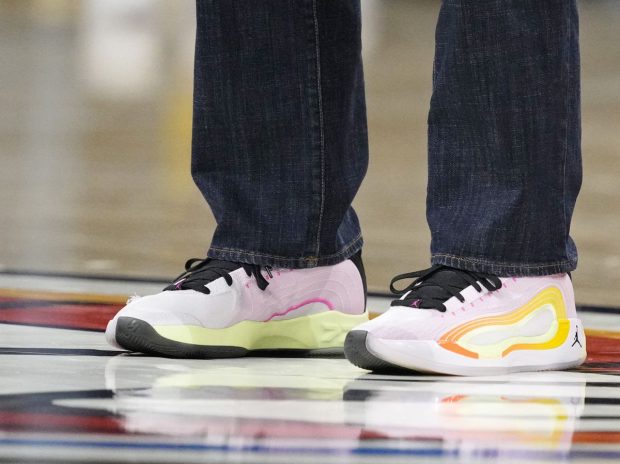Filipe Luis had staked his hopes on the right mix of European thought and Brazilian heart.
Speaking in his pre-match press conference at Hard Rock Stadium, Flamengo’s bright young coach revealed he had used Bayern Munich as a tactical reference for his own style of play and even admitted he had copied one or two things, particularly in the realm of pressing. But he also spoke about the fierce competitiveness of Brazilian players, how the extreme pressure they are routinely subjected to from fans and media in their homeland could be weaponised.
Advertisement
“I have no doubt that the strength, the mentality that Brazilian players have formed during all these years means we can equalise this difference in quality with extreme competitiveness,” he insisted. “Because for Europeans, winning this championship won’t change their lives, but for South Americans, it would certainly change our lives if we won this championship.”
Filipe Luis was not entirely proven wrong by the events of Sunday’s feisty FIFA Club World Cup last-16 game in Miami. His smart and sophisticated Flamengo team went toe-to-toe with Bayern, kept the ball from them for long stretches and made them deeply uncomfortable with the fluidity of their attacking movement. They also chased loose balls and flew into tackles with a ferocity that delighted the thousands who turned up at the Hard Rock to sing and cheer in red and black.
The problem was that none of it particularly mattered against a Bayern team this loaded with individual talent, and this motivated to bring it to bear on the pitch.

Bayern v Flamengo was fiercely contested but ultimately won by the European side (Photo: CHANDAN KHANNA/AFP via Getty Images)
Flamengo are unequivocally good. They are reigning Brazilian champions, very well coached, and almost certainly the best non-European team at this tournament. They are also, unsurprisingly, no match for an elite European side. Bayern could not meet their South American opponents’ athletic intensity in every minute in the stifling Miami heat, but they picked their spots to move through the gears, force opposition errors and punish them ruthlessly.
All four of their goals sprang directly or indirectly from winning the ball deep in the Flamengo half. The first two also benefited from slices of fortune that make an upset impossible when they favour the favourite: a Joshua Kimmich corner glancing off the head of Erick Pulgar and into his own net, followed by a Harry Kane shot that glanced off the shin of Leo Ortiz, then off the post.
Advertisement
Bayern’s third and fourth goals underlined their overwhelming individual quality.
Leon Goretzka intercepted a feeble Pulgar clearance about 25 yards from goal and rather than close out to him, three Flamengo players decided to block off the corner of the net to the left of goalkeeper Agustin Rossi. He calmly ran onto the ball and whipped a looping shot into the opposite corner.
In the second half Kane scored from the type of chance he has converted hundreds of times in his career: a ball into his feet in the box, one touch to bring it into his stride and another to place a firm low shot well beyond Rossi’s left hand. It was Bayern’s fourth shot on target of the match, and their fourth goal.
Flamengo never gave up and there was a 19-minute stint in the second half, between Jorginho’s trademark penalty and Kane’s clinical finish, when a shock began to feel possible. But in the end the fierce Brazilian competitiveness Filipe Luis had invoked only served to help make a broader statement about where the knockout rounds of this Club World Cup are heading.
After a vibrant group stage in which South American teams lost just three of 18 matches and seven non-European sides made it to the round of 16, football’s natural (and by that we of course mean largely financial) order began to restore itself on the tournament’s third weekend in the United States.
Bayern move on to the quarter-finals to face European champions Paris Saint-Germain, who earlier on Sunday destroyed Inter Miami so quickly, comprehensively and mercilessly that well before the end it had become less than ridiculous to feel sympathy for the plight of Lionel Messi. Chelsea’s absurd weather-delayed defeat of Benfica in Charlotte on Saturday may have been an all-European affair, but it still adhered almost perfectly to UEFA’s club rankings.
Advertisement
Palmeiras are the only non-European team guaranteed to be in the last eight, where Estevao and his current teammates will face his future Chelsea ones as clear underdogs. Of the four round of 16 ties still to be played, Inter, Manchester City, Real Madrid and Borussia Dortmund will all be heavily favoured to advance.
Within the space of one weekend, the Club World Cup which appeared to have no obvious script has suddenly positioned itself to follow the most predictable one of all, assuming the form that most always assumed it would eventually take: that of a summer Champions League, played out in higher temperatures and emptier stadiums with stranger kick-off times and a smaller, but still entirely familiar, European cast.
It cannot be overlooked that the dominance of Europe’s elite clubs is built in no small part on their ability to attract and to retain the best talent from the rest of the world. “The best player in the world was at Flamengo and is not here (now),” Filipe Luis said on Saturday, referring to Real Madrid superstar Vinicius Jr. “He went to Europe to play with the best teams in the world, with a higher salary, with better prestige, to play in better competitions.”
There is hope that revenue from Club World Cup participation can help clubs like Flamengo keep their best players for a little longer, though many of the European clubs taking them away are also getting richer in the United States this summer. More likely is that this new competition, which some hoped might disrupt football’s established order, simply ends up reinforcing it.
(Photo: Eston Parker/ISI Photos/ISI Photos via Getty Images)
This news was originally published on this post .








Be the first to leave a comment